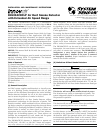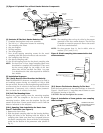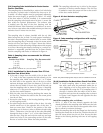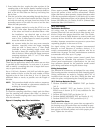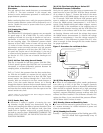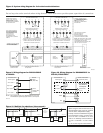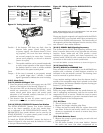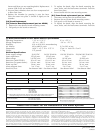
NOTE: The sampling tube end cap is critical to the proper
operation of the duct smoke detector. The end cap
is needed to create the proper air flow to the sensor
of the duct smoke detector.
Figure 4. Air duct detector sampling tube:
SAMPLING
TUBE
END CAP
AIR HOLES
ARROW
MUST
FACE
INTO AIR FLOW
AIR FLOW DIRECTION
FLANGE
H0108-02
Figure 5. Tube mounting configurations with varying
air flow direction:
AIR FLOW
DIRECTION
DETECTOR
HOUSING
DOTS INDICATE POSITION OF
SAMPLING TUBE HOLES
AIR FLOW
DIRECTION
DETECTOR
HOUSING
SAMPLING
TUBE
EXHAUST
TUBE
AIR FLOW
DIRECTION
EXHAUST
TUBE
SAMPLING
TUBE
SAMPLING
TUBE
EXHAUST
TUBE
DETECTOR
HOUSING
AIR FLOW
DIRECTION
DETECTOR
HOUSING
A.
B.
C.
D.
HORIZONTAL MOUNTING OF HOUSING
VERTICAL MOUNTING OF HOUSING
H0109-01
NOTE: Only metal sampling tubes may be used on orientations C and D.
[5.4.2] Installation For Ducts More Than 8 Feet Wide
NOTE: To install sampling tubes in ducts more than 8
feet wide, work must be performed inside the air
duct. Sampling of air in ducts wider than 8 feet is
accomplished by using the ST-10 sampling tube. If
the tube is shorter than the width of the air duct,
install the end cap into the sampling tube as shown
in Figure 4 and support the end opposite the duct
smoke detector.
Install the sampling tube as follows:
1. Drill a
3
/4″ hole in the duct directly opposite the hole
already drilled for the sampling tube. Make sure the hole
is 1 to 2″ below the inlet hole on the opposite side of the
duct to allow for moisture drainage.
2. Slide the sampling tube with the flange into the housing
bushing that meets the air flow first. Position the tube so
that the arrow points into the air flow. Secure the tube
flange to the housing bushing with two #6 self-tapping
screws.
[5.4] Sampling Tube Installation for Ducts Greater
Than 1
1
⁄2 Feet Wide
The sampling tube is identified by a series of air inlet holes
on the tube. A plastic tube is included for ducts up to 18″
in width. All other lengths must be purchased separately.
Order the correct length, as specified in Table 1, for width
of the duct where it will be installed. It is recommended
that the sampling tube length extend at least
2
⁄3 across the
duct width for optimal performance. The exhaust tube
is molded onto the base of the duct housing, and the
A2440-00 Exhaust Tube Extension is available as an acces-
sory in those cases where the molded exhaust port does not
extend at least 2 inches into the duct.
The sampling tube is always installed with the air inlet
holes facing into the air flow. To assist proper installation,
the tube’s mounting flange is marked with an arrow. Make
sure the sampling tube is mounted so that the arrow points
into the air flow (see Figure 4). Figure 5 shows the various
combinations of tube mounting configurations with respect
to air flow. Mounting the detector housing in a vertical ori-
entation is acceptable, provided that the air flows directly
into the sampling tube holes as indicated in Figure 4.
Table 1. Sampling tubes recommended for different
duct widths:
Outside Duct Width Sampling Tube Recommended*
1 to 2 ft. ST-1.5
2 to 4 ft. ST-3
4 to 8 ft. ST-5
8 to 12 ft. ST-10
*Must extend a minimum of
2
/3 the duct width
[5.4.1] Installation For Ducts Greater Than 1
1
⁄2 Feet
But Less Than 8 Feet Wide
1. If the tube is longer than the width of the air duct, drill
a
3
/4″ hole in the duct opposite the hole already cut for
the sampling tube. Make sure the hole is 1″ to 2″ below
the inlet hole on the opposite side of the duct to allow
moisture drainage away from the detector. If the tube is
shorter than the width of the air duct, install the end cap
into the sampling tube as shown in Figure 4. Sampling
tubes over 3 ft. long must be supported at the end oppo-
site the duct smoke detector.
2. Slide the tube into the housing bushing that meets the
air flow first. Position the tube so that the arrow points
into the air flow.
3. Secure the tube flange to the housing bushing with two
#6 self-tapping screws.
4. For tubes longer than the width of the air duct, the tube
should extend out of the opposite side of the duct. If
there are more than 2 holes in the section of the tube
extending out of the duct, select a different length using
Table 1. Otherwise, trim the end of the tube protruding
through the duct so that 1″ to 2″ of the tube extend out-
side the duct. Plug this end with the end cap and tape
closed any holes in the protruding section of the tube.
Be sure to seal the duct where the tube protrudes.
D200-14-00 3 I56-0084-08R



